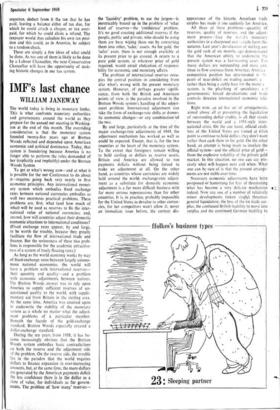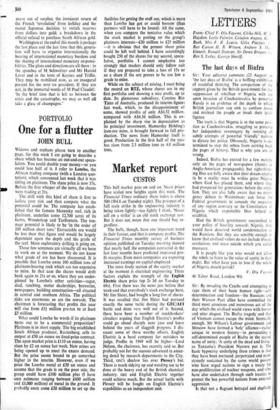IMF's last chance
WILLIAM JANEWAY
The world today is living in monetary limbo. This is what confronts monetary authorities and governments around the world as they prepare for the annual IMF meeting in Washing- ton at the end of this month. The overriding consideration is that the monetary system founded twenty-five years ago at Bretton Woods reflected and depended upon American economic and political dominance. Today, that system is foundering because America is no longer able to perform the roles demanded of her (explicitly and implicitly) under the Bretton Woods System.
To get at what's -Wrong now—and at what it is possible for the IMF Conference to do about it—requires going hick very nearly to first economic principles. Any international monet- ary system which embodies fixed exchange rates between national currencies embodies as well two enormous practical problems. These problems are, first, what (and how much of what) will be used as reserves to fix the inter- national value of national currencies; and, second, how will countries adjust their domestic economic situations to international conditions? (Fixed exchange rates appear, by and large, to be worth the trouble, because they greatly facilitate the flow of international trade and finance. But the seriousness of these two prob- lems is responsible for the academic attractive- ness of a system of freely floating rates.)
As long as the world economy works by way of fixed-exchange rates between largely autono- mous national economies, the world will have a problem with international reserves— their quantity and quality—and a problem with economic adjustments between nations. The Bretton Woods answer was to rely upon America to supply sufficient reserves of un- questioned quality to the world, with supple- mentary aid from Britain in the sterling area. At the same time, America was counted upon to underwrite the stability of the monetary system as a whole no matter what the adjust- ment problems of a particular member. Beneath the façade of the gold-exchange standard, Bretton Woods especially created a dollar-exchange standard.
During the ten years from 1958, it has be- come increasingly obvious that the Bretton Woods system embodies basic contradictions on both the reserve and the adjustment side of the problem. On the reserve side, the trouble lies in the paradox that the world requires dollars to finance expansion in ever-increasing amounts, but, at the same time, the more dollars are generated by the American payments deficit the less confidence there is in the dollar as a store of value, for individuals as for govern- ments. The problem of 'how many' reserves— the 'liquidity' problem, to use the jargon—is inextricably bound up in the problem of 'what kind of reserves—the `confidence' problem. It's no good creating additional reserves if the people, public and private, who should be using them are busy wiping them out by converting them into other, 'safer,' assets. As for gold, the 'safer' asset, there is not enough available at its present price to go around. A return to a pure gold system, at whatever price of gold required, would entail abdication of responsi- bility for economic and monetary affairs.
The problem of international reserves occu- pies the central position in considering from afar what's wrong with the present monetary system. However, of perhaps greater ;signifi- cance, from both the British and American points of view, is the paradox involved -in the Bretton Woods system's handling of the adjist- ment problem. International adjustment can take the form of exchange-rate shifts or domes- tic economic changes—or any combinationlof the two.
By and large, particularly at the time of .the major exchange-rate adjustments of 1949, the adjustment mechanism has worked as well as could be expected. Except, that is, for the two countries at the heart of the monetary system. To the extent that foreigners remain willing to hold sterling or dollars as reserve assets, Britain and America are allowed to run payments deficits without being forced to make an adjustment at all. On the other hand, as countries whose currencies are widely held around the world, exchange-rate adjust- ment as a substitute for domestic economic adjustment is a far more difficult business with far more serious repercussions than for other countries. It is, in practice, probably impossible for the United States to devalue to other curren- cies, for her competitors won't allow it; never an immediate issue before, the current dis-
appearance of the historic American trade surplus has made it one suddenly for America.
All three of these problems—quantity of reserves, quality of reserves. and the adjust- ment process—face the wor:d's monetar■, authorities in a sharpened and ' olatile form thi, autumn. Last year's devaluation of sterling and the gold rush of six months ago demonstrated that the American ability to underwrite the present system was a fast-wasting asset. To many dollars are outstanding and more con- tinue to flow overseas from America; Ameris:a competitive position has deteriorated tc ih. point of near-deficit on trading account; g rather than being a stable base for the mone: system, is the plaything of speculators a.- d governments; forced devaluations and trade controls threaten international economic rela- tions.
Right now, an ad hoc set of arrangements, aimed above all at preventing the liquidation of outstanding dollar credits. is all that stands between the world and a 1931-style inter- ,national crisis. On the one hand, official credi- tors of the United States are forced it crisis point to continue to hold dollars they don't want rather than cash them in for gold. On the other hand, an attempt is being made to insulate the official 'system—and the official price of gold— from the explosive volatility of the private giild market. In this situation, no one can say pre- cisely what will-happen next and when. What one can be sure of is that the present arrange- ments areliot stable over time.
Necessary:economic adjustments have be€n postponed or hamitrung for fear of threatening what has become a very delicate mechanism indeed. Now any one of a number of relatively minor developments. (taken singly) threatens general liquidation; the loss of the us trade sur- plus; the continued British-inability to move into surplus and the continued German inability to move out of surplus; the imminent return of the French 'revolution' from holiday and the recent Japanese decision to switch reserves from dollars into gold; a breakdown in the official refusal to purchase South African gold.
Washington at the end of this month is perhaps the last place and the last time that this genera- tion will have to organise internationally the bearing of international monetary burdens and the sharing of international monetary responsi- bilities. The plans and directions are all there : in the speeches of M Schweitzer and Mr Harold Lever and in the texts of Keynes and Triffin. They may be mobilised now, as an inaugural present for the next us president. If they are not, in the immortal words of M Paul Claudel: 'In the brief time that is left us between the crisis and the catastrophe, we may as well all take a glass of champagne.'







































 Previous page
Previous page